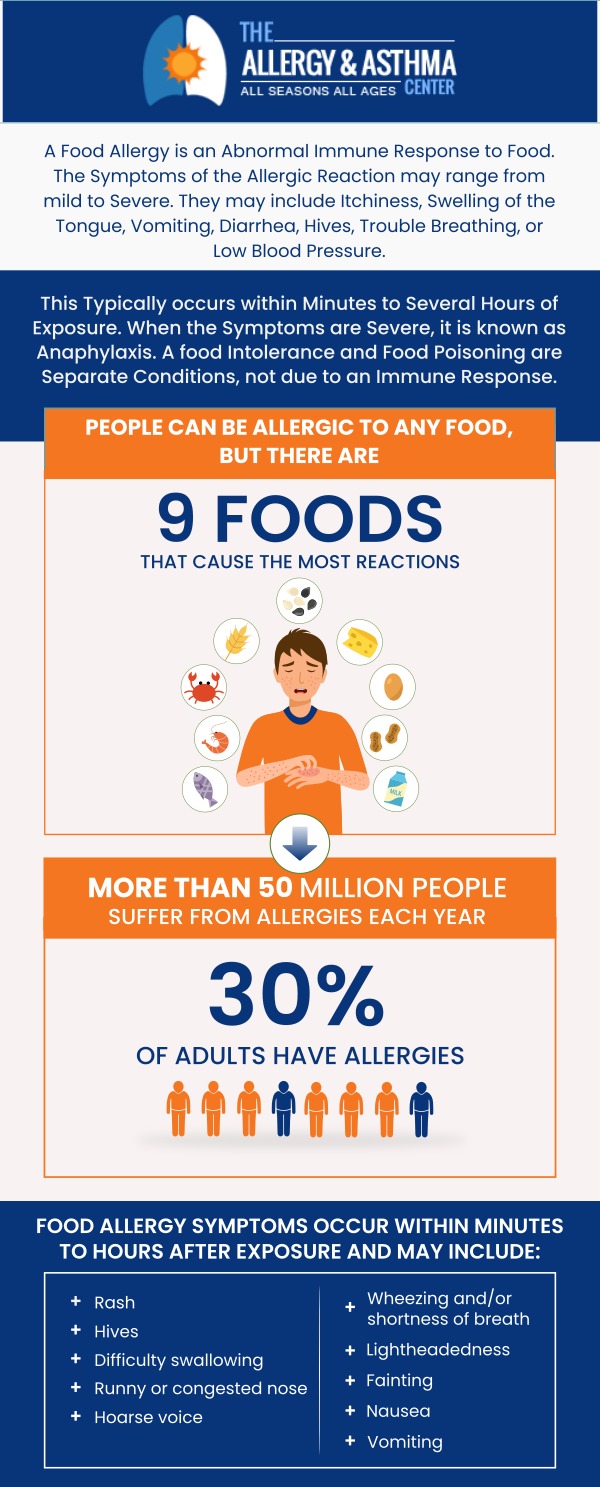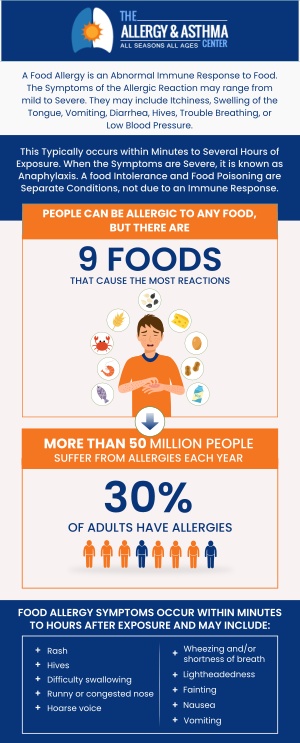Identify Food Allergies Early with Pediatric Testing
Dr. Jon E. Stahlman, MD, and our team of healthcare professionals at Allergy & Asthma Center specialize in pediatric food allergy testing and diagnosis. Early detection can help manage symptoms and improve your child’s quality of life. Our advanced testing methods are safe and effective, ensuring accurate results for personalized care. We work closely with families to create tailored treatment plans for long-term allergy management. Contact us today or book an appointment online. We have 3 convenient locations to serve you in Lawrenceville, GA, Atlanta, GA, and Conyers, GA.


Table of Contents:
What is the importance of identifying food allergies early in children?
How can early pediatric testing help with managing food allergies?
Are food allergies more common in children than adults?
How accurate are pediatric food allergy tests?
Early identification of food allergies in children is crucial for ensuring their safety, health, and overall quality of life. Recognizing and addressing these allergies promptly can help prevent severe reactions, manage chronic symptoms, and support healthy growth and development. Below are the key reasons why early diagnosis is essential:
Preventing Severe Reactions:
● Food allergies can trigger immune responses ranging from mild symptoms to life-threatening anaphylaxis.
● Early testing helps parents identify trigger foods, implement safety measures, and minimize exposure risks.
● Educating families on reading food labels and avoiding cross-contamination is key to preventing severe reactions.
Managing Chronic Symptoms and Nutritional Health:
● Chronic symptoms like digestive issues, skin conditions, or respiratory discomfort can impact daily life.
● Identifying food allergies early allows for dietary adjustments that alleviate these symptoms and improve well-being.
● Nutritional guidance ensures children receive the essential nutrients needed for growth and development despite dietary restrictions.
Supporting Long-Term Well-Being:
● Food allergies can affect a child’s emotional and social life, leading to anxiety or feelings of isolation.
● Early management equips children with strategies to confidently handle their allergies in various settings, boosting their confidence and social interactions.
● Early intervention also lays the foundation for ongoing management, reducing the risk of long-term complications and ensuring a healthier future.
Identifying food allergies early provides families with the tools and knowledge they need to create a safe and supportive environment for their children, promoting a healthier and happier life.
At Allergy & Asthma Center, we understand the crucial role that early pediatric testing for food allergies plays in managing and alleviating the potential challenges associated with these conditions. Identifying food allergies at a young age can significantly impact a child’s health and quality of life, and our dedicated team is here to support you every step of the way.
Early testing for food allergies is a critical step in safeguarding a child’s health and well-being. Timely diagnosis enables parents and healthcare providers to take proactive measures to manage dietary and lifestyle adjustments, minimizing the risk of allergic reactions and supporting a child’s overall development. Here are the key reasons early testing is essential:
● Identification of Allergenic Foods: Comprehensive testing pinpoints specific allergenic foods, helping parents avoid triggers in their child’s diet. This reduces the risk of reactions such as hives, eczema, digestive discomfort, or respiratory issues, improving daily comfort.
● Tailored Nutritional Plans: Early diagnosis allows for personalized nutrition plans to ensure children meet their dietary needs while avoiding allergens. These plans support healthy growth and development despite dietary restrictions.
● Accurate Diagnosis: Early testing differentiates between true food allergies and other conditions with similar symptoms, such as intolerances, to avoid unnecessary restrictions or interventions.
Long-Term Advantages:
● Health and Safety: Early identification can pave the way for treatments like oral immunotherapy, potentially reducing reaction severity over time. Some children may even outgrow certain food allergies with proper monitoring and management.
● Education and Preparedness: Parents and children learn essential skills such as reading food labels, identifying hidden allergens, and preventing cross-contamination. Guidance on emergency responses, like using an epinephrine injector, ensures families feel confident managing allergies in various settings.
● Ongoing Monitoring: Early testing provides a baseline for tracking allergy status and evaluating the effectiveness of management strategies. Regular follow-ups ensure care evolves with the child’s changing needs, promoting long-term health and well-being.
Proactive testing and management empower families to create a safe and supportive environment, enabling children to thrive while navigating their food allergies confidently.
Food allergies are more common in children than in adults. Research shows that a significant percentage of children develop food allergies early in life, often during infancy or early childhood. Common allergens for children include milk, eggs, peanuts, wheat, soy, and tree nuts. While some children may outgrow certain food allergies, others can persist into adulthood, and new allergies can also develop later in life. However, the prevalence of food allergies tends to be higher among children due to the immaturity of their immune and digestive systems.
Children are more susceptible to food allergies because their immune systems are still developing and may react to proteins in certain foods as harmful invaders. This reaction triggers symptoms such as hives, vomiting, diarrhea, or even severe anaphylaxis in some cases. Early identification and management of food allergies are crucial to prevent complications, ensuring proper nutrition, and reducing the risk of exposure to allergens. Pediatricians often recommend allergy testing for children showing symptoms or those with a family history of allergies.
In adults, food allergies are less common but can still occur, particularly with allergens like shellfish, peanuts, or tree nuts. Adults may also experience cross-reactivity, where allergies to pollen can trigger reactions to certain fruits or vegetables. While the underlying causes of food allergies differ slightly between children and adults, the higher prevalence in children underscores the importance of early testing and intervention to support their growth, development, and safety.
Pediatric food allergy tests are valuable tools for diagnosing allergies, but their accuracy depends on the type of test, the child’s specific condition, and proper interpretation by healthcare professionals. Testing provides important insights into potential allergic reactions, helping to guide effective management and dietary adjustments. However, no test is 100% accurate, and results must always be evaluated in conjunction with a child’s medical history and symptoms.
Common Pediatric Food Allergy Tests
● Skin Prick Test (SPT): This widely used test identifies IgE-mediated allergic responses by introducing small amounts of allergens into the skin. It is generally reliable, especially when conducted by experienced healthcare providers, but it may occasionally yield false positives or negatives, requiring further evaluation.
● Blood Tests (RAST or ImmunoCAP): These tests measure specific IgE antibodies in the blood and are beneficial for children unable to undergo skin tests. While effective for screening a wide range of allergens, they can also produce false positives and are often combined with other diagnostic methods.
● Oral Food Challenge: Considered the gold standard for food allergy diagnosis, this test involves consuming small amounts of the suspected allergen under medical supervision. It provides highly accurate results and is typically performed when other tests yield inconclusive outcomes.
The accuracy of pediatric food allergy tests improves when multiple methods are combined and interpreted by a skilled healthcare professional. While tests like SPTs and blood tests can provide valuable clues, they are not definitive on their own. Oral food challenges in a controlled environment remain the most reliable method for confirming food allergies.
Consulting with a knowledgeable provider ensures that the testing process is safe, accurate, and tailored to the child’s unique needs. Contact us today or schedule your consultation online to learn more. We have 3 convenient locations to serve you in Lawrenceville, GA, Atlanta, GA, and Conyers, GA. We also serve patients from Scottsdale GA, Tucker GA, Rock Chapel Rd GA, Klondike Rd GA, Suwanee GA, Moon Place Rd GA and Dacula GA.

Additional Allergy & Asthma Services
▸ Allergy Shots
▸ Allergy Testing
▸ Asthma
▸ Bronchodilators
▸ Drug Allergy
▸ Food Allergy
▸ Insect Allergy
▸ Nasal/Sinus Allergies
▸ Pediatric Allergy
▸ Pediatric Asthma
▸ Skin Allergy
▸ Spring Allergies




